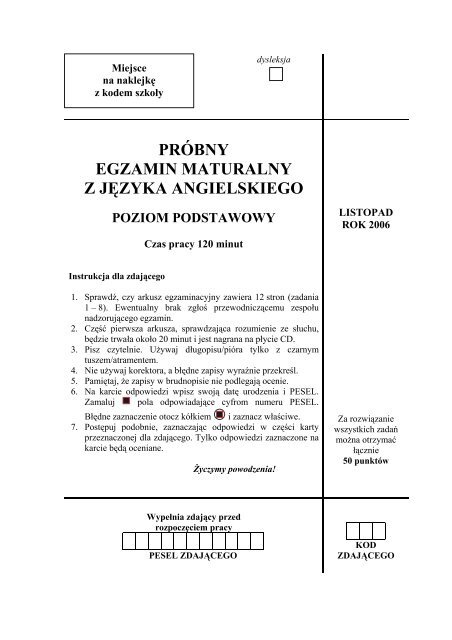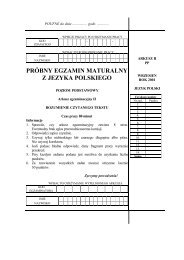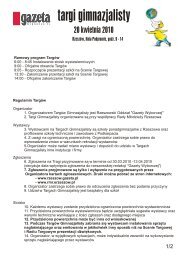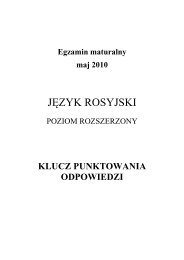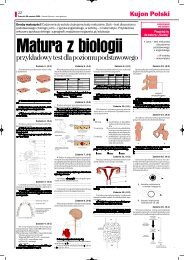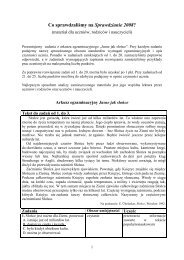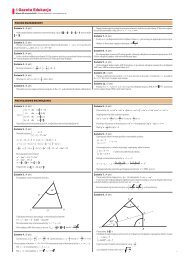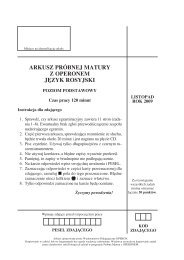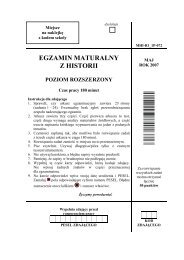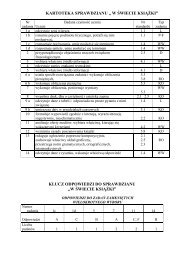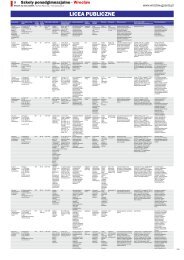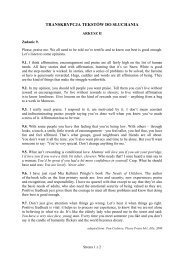Arkusz
Arkusz
Arkusz
Create successful ePaper yourself
Turn your PDF publications into a flip-book with our unique Google optimized e-Paper software.
Miejsce<br />
na naklejkę<br />
z kodem szkoły<br />
dysleksja<br />
PRÓBNY<br />
EGZAMIN MATURALNY<br />
Z JĘZYKA ANGIELSKIEGO<br />
POZIOM PODSTAWOWY<br />
Instrukcja dla zdającego<br />
Czas pracy 120 minut<br />
1. Sprawdź, czy arkusz egzaminacyjny zawiera 12 stron (zadania<br />
1 – 8). Ewentualny brak zgłoś przewodniczącemu zespołu<br />
nadzorującego egzamin.<br />
2. Część pierwsza arkusza, sprawdzająca rozumienie ze słuchu,<br />
będzie trwała około 20 minut i jest nagrana na płycie CD.<br />
3. Pisz czytelnie. Używaj długopisu/pióra tylko z czarnym<br />
tuszem/atramentem.<br />
4. Nie używaj korektora, a błędne zapisy wyraźnie przekreśl.<br />
5. Pamiętaj, że zapisy w brudnopisie nie podlegają ocenie.<br />
6. Na karcie odpowiedzi wpisz swoją datę urodzenia i PESEL.<br />
Zamaluj pola odpowiadające cyfrom numeru PESEL.<br />
Błędne zaznaczenie otocz kółkiem i zaznacz właściwe.<br />
7. Postępuj podobnie, zaznaczając odpowiedzi w części karty<br />
przeznaczonej dla zdającego. Tylko odpowiedzi zaznaczone na<br />
karcie będą oceniane.<br />
Życzymy powodzenia!<br />
Wypełnia zdający przed<br />
rozpoczęciem pracy<br />
PESEL ZDAJĄCEGO<br />
LISTOPAD<br />
ROK 2006<br />
Za rozwiązanie<br />
wszystkich zadań<br />
można otrzymać<br />
łącznie<br />
50 punktów<br />
KOD<br />
ZDAJĄCEGO
2<br />
Próbny egzamin maturalny z języka angielskiego<br />
Poziom podstawowy<br />
ROZUMIENIE ZE SŁUCHU<br />
Zadanie 1. (6 pkt)<br />
Zapoznaj się z treścią zadania. Usłyszysz dwukrotnie fragment wywiadu. Na podstawie<br />
usłyszanych informacji zdecyduj, które z podanych zdań są zgodne z treścią tekstu<br />
/TRUE/, a które nie /FALSE/. Zaznacz znakiem X odpowiednią rubrykę w tabeli.<br />
Za każdą poprawną odpowiedź otrzymasz 1 punkt.<br />
1.1. For the last 15 years Alister McCrone has worked only in Scotland.<br />
1.2. The company has changed its name.<br />
1.3. Local people like going to the theatre.<br />
1.4. In summer, they prepare plays only for tourists.<br />
1.5. The company is planning to move the theatre to a new place.<br />
1.6. The theatre is popular because a lot of people like small theatres.<br />
PRZENIEŚ ROZWIĄZANIE NA KARTĘ ODPOWIEDZI!<br />
TRUE FALSE<br />
Zadanie 2. (5 pkt)<br />
Zapoznaj się z treścią zadania. Usłyszysz dwukrotnie wypowiedzi nastolatków na temat<br />
sytuacji, w których poczuli się zawstydzeni (2.1.-2.5.). Przyporządkuj każdej wypowiedzi<br />
zdanie podsumowujące jej treść (A-F). Wpisz odpowiednią literę w miejsce obok<br />
numeru każdej wypowiedzi. Jedno zdanie podane zostało dodatkowo i nie pasuje do<br />
żadnej wypowiedzi. Za każdą poprawną odpowiedź otrzymasz 1 punkt.<br />
A. I asked the wrong question.<br />
B. My mum asked me an embarrassing question.<br />
C. I ate too much and had to go to hospital.<br />
D. I hurt my mum accidentally.<br />
E. I was ashamed of my mum.<br />
F. I chose the wrong person.<br />
2.1. ___ 2.2. ____ 2.3. ____ 2.4. ____ 2.5. ____<br />
PRZENIEŚ ROZWIĄZANIE NA KARTĘ ODPOWIEDZI!
Próbny egzamin maturalny z języka angielskiego<br />
Poziom podstawowy<br />
Zadanie 3. (4 pkt)<br />
Zapoznaj się z treścią zadania. Usłyszysz dwukrotnie tekst narracyjny. Z podanych<br />
możliwości odpowiedzi wybierz właściwą, zgodną z treścią tekstu. Zaznacz literę A, B<br />
lub C. Za każdą poprawną odpowiedź otrzymasz 1 punkt.<br />
3.1. Why did Monica come to Ireland?<br />
A. It was part of her holiday plan.<br />
B. She liked the summer there.<br />
C. She wanted to find a job there.<br />
3.2. What happened to Monica’s money?<br />
A. She lost some.<br />
B. She spent it.<br />
C. It was stolen.<br />
3.3. How did Monica find out about the job?<br />
A. Antonio informed her about it.<br />
B. She learnt about it from a paper.<br />
C. Her mother wrote her an e-mail.<br />
3.4. Which statement is true about Monica’s stay with the Brennans?<br />
A. She thought she would have to move very soon.<br />
B. She found the names of the other workers difficult.<br />
C. She enjoyed staying with the family very much.<br />
PRZENIEŚ ROZWIĄZANIE NA KARTĘ ODPOWIEDZI!<br />
3
4<br />
Próbny egzamin maturalny z języka angielskiego<br />
Poziom podstawowy<br />
ROZUMIENIE TEKSTU CZYTANEGO<br />
Zadanie 4. (6 pkt)<br />
Przeczytaj uważnie poniższy tekst. Następnie dopasuj do każdej części tekstu (4.1. – 4.6.)<br />
właściwy tytuł (A – G) i wpisz odpowiednie litery w kratki. Jeden tytuł został podany<br />
dodatkowo i nie pasuje do żadnej części tekstu. Za każdą poprawną odpowiedź<br />
otrzymasz 1 punkt.<br />
A.<br />
AN EXPLANATION OF THE STUDENTS<br />
BEHAVIOUR<br />
B. CHEATING DOESN’T PAY<br />
C. AN EXAMPLE OF PUNISHMENT<br />
D. CHEATING AS SOMETHING DISHONOURABLE<br />
E.<br />
MODERN TECHNOLOGY AS A THREAT TO<br />
HONESTY AT SCHOOL<br />
F. SHAMEFUL STATISTICS<br />
G. NEW METHODS TO STOP PLAGIARISM<br />
4.1.<br />
In Britain, cheating in exams, or school work, is not just seen by the authorities as<br />
undesirable, it is seen by the students themselves as offensive. If you copy somebody else’s<br />
essay, you’re not just taking objective data from them, you’re actually stealing nothing less<br />
than their own personal style and ideas. So to cheat, in the British way of thinking, is seen -<br />
like plagiarism - as somehow shameful.<br />
4.2.<br />
As to cheating, Polish students do not have a good international reputation. An informal study<br />
carried out by English teachers in the late 1990s, confirms this view. It found that 93.3% of<br />
students admitted to cheating at some time during the previous academic year. Cheating,<br />
it seems, is widespread in Polish educational establishments.<br />
4.3.<br />
In Polish schools, cheating is ignored. From a very early age, Polish children have to acquire<br />
a frightful amount of knowledge, and the weight of the books they have to carry to school and<br />
back would drive a camel to suicide. Cheating, therefore, can be viewed as a natural defence<br />
mechanism against the system, but if we go deeper we will see that cheating in school is<br />
a direct consequence of a specific mentality developed in Polish society by centuries of<br />
tyranny.
Próbny egzamin maturalny z języka angielskiego<br />
Poziom podstawowy<br />
4.4.<br />
The most recent plague is plagiarism via the Internet. Students can search by using<br />
commonly-known search engines or go straight to one of the many so-called ‘paper mills’,<br />
where hundreds of essays are on offer for downloading, usually at a very low price.<br />
In the world, where ‘creativity is great, but plagiarism is faster’, is there anything that can be<br />
done to stop the newly-born cyber-cheat?<br />
4.5.<br />
The consequences of cheating, if you get caught in a British school, can be serious.<br />
I remember when I was doing my ‘A’ levels in England, one boy was caught cheating<br />
in an exam. He wasn’t allowed to complete the paper. And for all the other exams he had to<br />
sit by himself at a desk up on a platform, at the front of the room, so that everyone could see<br />
who he was.<br />
4.6.<br />
If you want to better yourself, cheating is worse than useless. If you cheat and get away with<br />
it, you’re tempted to do the same again, not understanding that you’ve effectively done harm<br />
to yourself. You’ve cheated your school, classmates and teacher. You’ve cheated the<br />
education system and society. But most importantly, you have cheated yourself.<br />
PRZENIEŚ ROZWIĄZANIE NA KARTĘ ODPOWIEDZI!<br />
adapted from The World of English, 1/2002<br />
5
6<br />
Próbny egzamin maturalny z języka angielskiego<br />
Poziom podstawowy<br />
Zadanie 5. (8 pkt)<br />
Przeczytaj poniższy tekst. Na podstawie informacji w nim zawartych zdecyduj, które<br />
z podanych zdań są prawdziwe (TRUE), a które fałszywe (FALSE). Zaznacz znakiem X<br />
odpowiednią rubrykę w tabeli.<br />
Za każdą poprawną odpowiedź otrzymasz 1 punkt.<br />
I am going to tell you about a funny thing that happened to my mother and me yesterday<br />
evening. …<br />
Yesterday afternoon, my mother took me up to London to see the dentist. After that,<br />
we went to a café. I had a banana split and my mother had a cup of coffee.<br />
When we came out of the café it had started to rain. ‘We must get a taxi,’ my mother said.<br />
It was raining quite hard.<br />
‘Why don’t we go back into the café and wait for it to stop?’ I said. I wanted another<br />
of those banana splits. They were very tasty.<br />
‘It isn’t going to stop,’ my mother said. ‘We must get home.’<br />
We stood on the pavement in the rain, looking for a taxi.<br />
Just then a man came up to us. He was a small man and he was pretty old. He raised his<br />
hat politely and said to my mother, ‘Excuse me, I do hope you will excuse me …’<br />
‘Yes?’ my mother said, very cool and distant.<br />
‘I wonder if I could ask a small favour of you,’ he said. ‘It is only a very small favour.’<br />
I saw my mother looking at him suspiciously. …<br />
‘The truth of the matter is,’ the little man was saying, ‘I need some help.’<br />
He gave a gentle smile and said, ‘I beg you to believe, madam, that I am not in the habit<br />
of stopping ladies in the street and telling them my troubles.’<br />
‘I should hope not,’ my mother said.<br />
I felt quite embarrassed by her sharp words. I wanted to say to her, ‘Oh, mummy, he’s<br />
a very old man, and he’s sweet and polite, and he’s in trouble, so don’t be so unkind to him.’<br />
But I didn’t say anything.<br />
The little man shifted his umbrella from one hand to the other. ‘I’ve never forgotten<br />
it before,’ he said.<br />
‘You’ve never forgotten what?’ my mother asked.<br />
‘My wallet,’ he said. ‘I must have left it in my other jacket.’<br />
‘Are you asking me to give you money?’ my mother said.<br />
‘Oh, no!’ he cried.<br />
‘Then what are you asking?’ my mother said. ‘Do hurry up. We’re getting very wet here.’<br />
‘I know you are,’ he said. ‘And that is why I’m offering you this umbrella of mine<br />
to protect you, and to keep forever, if … if only …’<br />
‘If only what?’ my mother said.<br />
‘If only you would give me in return a pound for my taxi-fare just to get me home,’<br />
the little man said, ‘It’s a lovely umbrella.’<br />
‘So I’ve noticed,’ my mother said.<br />
‘It’s silk,’ he said.<br />
‘I can see that.’<br />
‘Then why don’t you take it, madam,’ he said. ‘It cost me over twenty pounds, I promise<br />
you. But that’s of no importance so long as I can get home and rest these old legs of mine.’<br />
Then my mother said to the little man, ‘I don’t think it’s quite right that I should take<br />
an umbrella from you worth twenty pounds. I think I’d better just give you the taxi-fare.’<br />
‘No, no no!’ he cried. ‘It’s out of the question!’
Próbny egzamin maturalny z języka angielskiego<br />
Poziom podstawowy<br />
My mother took out a pound note. She held it out to the little man. He took it and handed<br />
her the umbrella. ‘Thank you, madam, thank you.’ Then he was gone.<br />
‘Aren’t we lucky,’ my mother said. ‘I've never had a silk umbrella before. I couldn’t<br />
afford it.’<br />
adapted from Ronald Dahl, Ten Short Stories, The Umbrella Man<br />
5.1.<br />
5.2.<br />
The girl and her mother went to London to have a banana split<br />
in a café.<br />
The girl’s mother wanted to catch a taxi because the weather had<br />
changed.<br />
5.3. The girl was still hungry, so she wanted to go to the café again.<br />
5.4. The girl told her mother that she should be more polite to the man.<br />
5.5. The man’s problem was that he had lost his wallet.<br />
5.6.<br />
5.7.<br />
The girl’s mother realized that the umbrella was worth more than<br />
one pound.<br />
The man was disappointed with the money he had got<br />
for his umbrella.<br />
5.8. The story takes place on a rainy day.<br />
PRZENIEŚ ROZWIĄZANIE NA KARTĘ ODPOWIEDZI!<br />
TRUE FALSE<br />
Zadanie 6. (6 pkt)<br />
Przeczytaj poniższy tekst. Z podanych odpowiedzi wybierz właściwą, zgodną z treścią<br />
tekstu. Zaznacz jedną z czterech możliwości, zakreślając literę A, B, C lub D.<br />
Za każdą poprawną odpowiedź otrzymasz 1 punkt.<br />
Shoplifting is an addictive crime. There are two types of shoplifters (people who steal<br />
goods from shops): professional criminals who do it for a living, or to earn money for a drug<br />
habit; and non-professionals. Non-professionals know that there are consequences, and they<br />
usually have the money to pay, but they continue to steal anyway. These people steal items<br />
they often don’t need and sometimes don’t use.<br />
Although people of all ages shoplift, almost one third of all shoplifters arrested<br />
by the police are between the ages of 13 and 17. Teens usually steal things that they can’t<br />
afford or are not allowed to buy, such as CDs, cosmetics, clothes and cigarettes. But many<br />
also steal things they could simply buy. Why? ‘I think, I could be spending my money on this,<br />
but I’m getting it for free,’ a teenage girl said. ‘Besides, there’s also the thrill of doing<br />
something bad. Your heart starts to race, and all you can think about is getting out of the<br />
store,’ the girl added.<br />
7
8<br />
Próbny egzamin maturalny z języka angielskiego<br />
Poziom podstawowy<br />
Teens who shoplift often believe their actions don’t really hurt anyone. They don’t<br />
think that shoplifting means stealing. They think that the store will not notice the losses. They<br />
are wrong. Stores know exactly how many articles they lose, and the costs are huge. Ask teens<br />
who shoplift why they do it, and they usually say they don’t know. Or they may say that it’s<br />
fun; shoplifting can cheer up the mood of a teen who is feeling depressed, angry or bored.<br />
Friends can also force friends to shoplift together – to be cool.<br />
But why? Shoplifters usually don’t know the true motivations behind their actions.<br />
However, shoplifting can become an addiction. In fact, drug addicts who shoplift say it is<br />
as hard to stop stealing as it is to quit drugs. Without intervention, shoplifting can become<br />
a dangerous lifetime habit.<br />
For teens who are just ‘trying out’ shoplifting, the best thing that can happen is getting<br />
caught. And the sooner, the better. When they are caught by store security personnel, they feel<br />
frightened, and the experience can stop many teens from repeating their behaviour.<br />
Shoplifting is stealing. Stealing is wrong. It’s really just that simple.<br />
6.1. According to paragraph one,<br />
A. non-professionals work with professionals.<br />
B. some professionals are addicted to drugs.<br />
C. non-professionals rarely have enough money.<br />
D. professionals steal things that they do not need.<br />
6.2. In paragraph two, you can find out<br />
A. what articles were stolen by a teenage girl.<br />
B. why people of different ages steal from shops.<br />
C. how shoplifters manage to get out of stores.<br />
D. what things are usually stolen by young people.<br />
6.3. Paragraph three is about the reasons why<br />
A. young people steal from shops.<br />
B. shoplifting makes people angry.<br />
C. stores do not notice their losses.<br />
D. teenagers say shoplifting is wrong.<br />
6.4. Paragraph four informs you that<br />
A. shoplifters cannot often tell why they steal.<br />
B. most shoplifters can’t live without taking drugs.<br />
C. some shoplifters are scared of their bad habit.<br />
D. quitting drugs is easier than giving up stealing.<br />
6.5. According to paragraph five,<br />
A. many teenagers think that shoplifting is simple.<br />
B. it is quite easy for teenagers to get really scared.<br />
C. some teenagers often frighten security personnel.<br />
D. young shoplifters should be caught as soon as possible.<br />
6.6. Which of the following would be the best title for the text?<br />
A. How to Catch Shoplifters<br />
B. How to Recognise Shoplifters<br />
C. Teenagers Who Steal from Shops<br />
D. Burglars Who Never Get Caught<br />
PRZENIEŚ ROZWIĄZANIE NA KARTĘ ODPOWIEDZI!<br />
adapted from Weekly Reader, 2003
Zadanie 7. (5 pkt)<br />
Próbny egzamin maturalny z języka angielskiego<br />
Poziom podstawowy<br />
WYPOWIEDŹ PISEMNA<br />
Napisz zaproszenie dla swoich przyjaciół z zagranicy.<br />
• Zaproś ich na przyjęcie z okazji powitania Nowego Roku.<br />
• Poinformuj, jakie stroje są oczekiwane.<br />
• Poproś o przyniesienie czegoś do jedzenia lub picia.<br />
• Zachęć do uczestnictwa we wspólnej zabawie.<br />
Podpisz się jako XYZ. W zadaniu nie jest określony limit słów. Oceniana jest umiejętność<br />
zwięzłego przekazu wszystkich informacji określonych w poleceniu (4 punkty)<br />
oraz poprawność językowa (1 punkt).<br />
CZYSTOPIS<br />
.........................................................................................................................................<br />
.........................................................................................................................................<br />
.........................................................................................................................................<br />
.........................................................................................................................................<br />
.........................................................................................................................................<br />
.........................................................................................................................................<br />
.........................................................................................................................................<br />
.........................................................................................................................................<br />
.........................................................................................................................................<br />
.........................................................................................................................................<br />
.........................................................................................................................................<br />
.........................................................................................................................................<br />
Liczba<br />
punktów<br />
TREŚĆ<br />
Inf. 1 Inf. 2 Inf. 3 Inf. 4<br />
POPRAWNOŚĆ<br />
JĘZYKOWA<br />
0-1 0-1 0-1 0-1 0-1<br />
RAZEM<br />
9
10<br />
Zadanie 8. (10 pkt)<br />
Próbny egzamin maturalny z języka angielskiego<br />
Poziom podstawowy<br />
Będziesz zajmować się grupą z Anglii w czasie jej pobytu w Polsce. Napisz list do<br />
nauczyciela, opiekuna grupy.<br />
• Poinformuj o miejscu zakwaterowania i planowanych posiłkach.<br />
• Doradź, jakie rzeczy i dlaczego powinni zabrać ze sobą uczestnicy.<br />
• Przedstaw jeden z punktów programu i uzasadnij jego atrakcyjność.<br />
• Wyraź zadowolenie ze spotkania w Polsce i przekaż życzenia udanej podróży.<br />
Pamiętaj o zachowaniu odpowiedniej formy listu. Nie umieszczaj żadnych adresów.<br />
Podpisz się jako XYZ. Długość listu powinna wynosić od 120 do 150 słów. Oceniana<br />
jest umiejętność pełnego przekazania informacji (4 punkty), forma (2 punkty), bogactwo<br />
językowe (2 punkty) oraz poprawność językowa (2 punkty).<br />
CZYSTOPIS<br />
.....................................................................................................................................<br />
.....................................................................................................................................<br />
.....................................................................................................................................<br />
.....................................................................................................................................<br />
.....................................................................................................................................<br />
.....................................................................................................................................<br />
.....................................................................................................................................<br />
.....................................................................................................................................<br />
.....................................................................................................................................<br />
.....................................................................................................................................<br />
.....................................................................................................................................<br />
.....................................................................................................................................<br />
.....................................................................................................................................<br />
.....................................................................................................................................<br />
.....................................................................................................................................<br />
.....................................................................................................................................<br />
.....................................................................................................................................
Próbny egzamin maturalny z języka angielskiego<br />
Poziom podstawowy<br />
.....................................................................................................................................<br />
.....................................................................................................................................<br />
.....................................................................................................................................<br />
.....................................................................................................................................<br />
.....................................................................................................................................<br />
.....................................................................................................................................<br />
.....................................................................................................................................<br />
.....................................................................................................................................<br />
.....................................................................................................................................<br />
.....................................................................................................................................<br />
.....................................................................................................................................<br />
.....................................................................................................................................<br />
.....................................................................................................................................<br />
.....................................................................................................................................<br />
.....................................................................................................................................<br />
.....................................................................................................................................<br />
.....................................................................................................................................<br />
.....................................................................................................................................<br />
.....................................................................................................................................<br />
Liczba<br />
punktów<br />
TREŚĆ<br />
Inf. 1 Inf. 2 Inf. 3 Inf. 4<br />
FORMA BOGACTWO<br />
JĘZYKOWE<br />
POPRAWNOŚĆ<br />
JĘZYKOWA<br />
0-0,5-1 0-0,5-1 0-0,5-1 0-0,5-1 0-1-2 0-1-2 0-1-2<br />
11<br />
RAZEM
12<br />
Próbny egzamin maturalny z języka angielskiego<br />
Poziom podstawowy<br />
BRUDNOPIS (nie podlega ocenie)
12<br />
Próbny egzamin maturalny z języka angielskiego<br />
Poziom podstawowy<br />
BRUDNOPIS (nie podlega ocenie)


